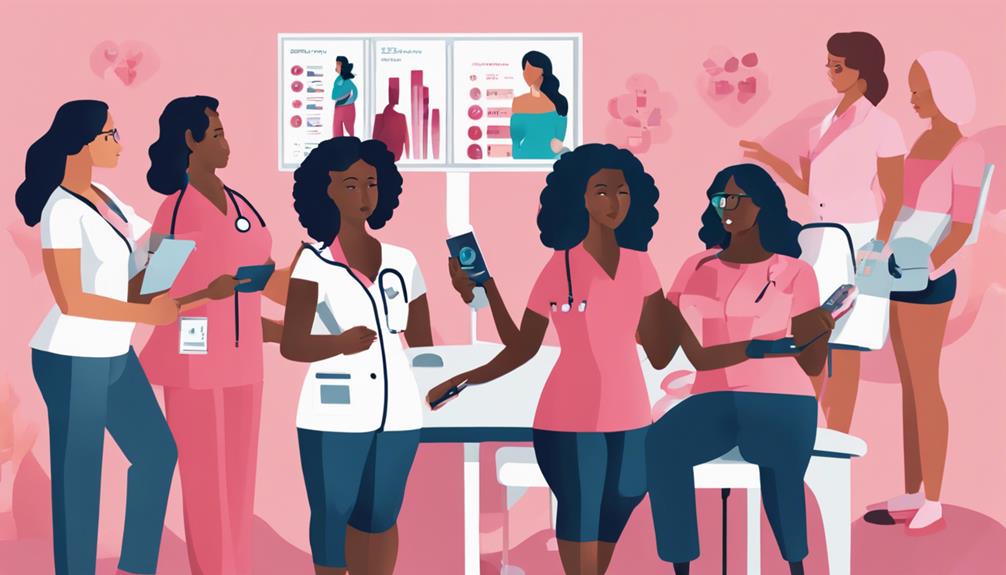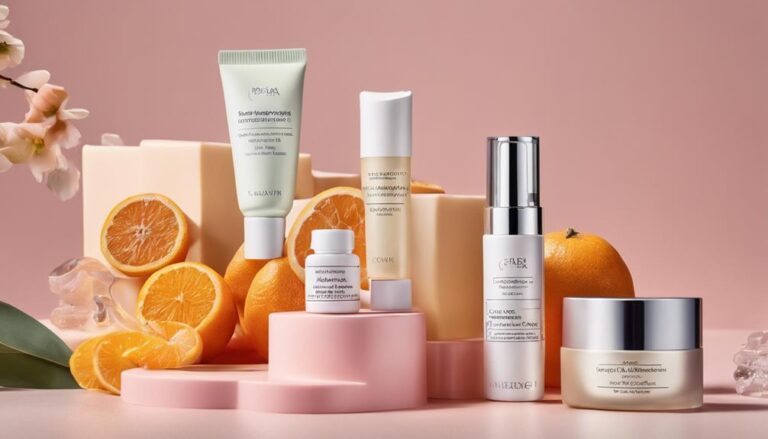10 Essential Habits for Women to Stay Healthy in Their 30s
Maintaining your health in your 30s is crucial for long-term well-being. From nourishing your body with the right foods to prioritizing mental wellness, there are key habits that can make a significant impact on your overall health. By incorporating these 10 essential practices into your daily routine, you can set a strong foundation for a healthier future. So, are you ready to take charge of your well-being and discover the habits that can empower you in your 30s?
Balanced Diet
To maintain optimal health in your 30s, focusing on a balanced diet is crucial. Meal planning plays a significant role in ensuring you receive all the necessary nutrients your body needs. Incorporating a variety of fruits, vegetables, whole grains, lean proteins, and healthy fats into your meals can help you achieve a well-rounded diet. Additionally, consider adding nutritional supplements to fill any nutrient gaps that may be challenging to meet through food alone.
When planning your meals, aim for a colorful plate, as different colors in fruits and vegetables indicate varying nutrients. Be mindful of portion sizes to maintain a healthy weight and prevent overeating. Including sources of calcium, iron, vitamin D, and omega-3 fatty acids can support bone health, energy levels, and overall well-being.
Regular Exercise
Maintaining a regular exercise routine is essential for women in their 30s to support overall health and well-being. Engaging in fitness routines and physical activity can bring numerous benefits that can positively impact your life. Here are three key reasons why regular exercise is crucial for women in their 30s:
- Physical Health: Regular exercise helps maintain a healthy weight, reduces the risk of chronic diseases such as heart disease and diabetes, and boosts your immune system.
- Mental Well-being: Physical activity releases endorphins, which are natural mood lifters, reducing stress, anxiety, and symptoms of depression. It also improves cognitive function and overall mental clarity.
- Longevity: By incorporating regular exercise into your routine, you increase your chances of living a longer, healthier life. It can improve your quality of life, enhance your energy levels, and promote better sleep patterns. Remember, finding activities you enjoy will make sticking to your fitness routine easier and more enjoyable.
Adequate Hydration
Regular exercise contributes significantly to your overall well-being, and one crucial aspect often overlooked is adequate hydration. Hydration benefits are numerous and vital for your health in your 30s. Staying well-hydrated supports your metabolism, aids digestion, and helps maintain healthy skin.
Proper water intake is essential for regulating body temperature, cushioning joints, and transporting nutrients and oxygen to cells. Dehydration can lead to fatigue, headaches, and difficulty concentrating, affecting your daily life and productivity.
To ensure you're drinking enough water, aim for about 8-10 cups per day, adjusting based on your activity level and climate. Remember, thirst isn't always a reliable indicator of hydration, so make a habit of sipping water throughout the day. Consider carrying a reusable water bottle with you as a reminder to stay hydrated.
Mental Health Check-ins
Ensuring regular mental health check-ins is crucial for women in their 30s to monitor and prioritize their emotional well-being. By actively engaging in self-reflection and seeking appropriate support, you can nurture your mental health effectively. Here are some key practices to incorporate into your routine:
- Self Care Practices: Dedicate time for activities that bring you joy and relaxation, whether it's reading a book, going for a walk, or enjoying a hobby.
- Mindfulness Techniques: Practice mindfulness through activities like meditation, deep breathing, or yoga to help center yourself and reduce stress levels.
- Exploring Therapy Options: Consider seeking professional help through therapy or counseling to work through any emotional challenges and develop coping strategies.
Quality Sleep
As you focus on nurturing your mental well-being through self-care practices and mindfulness techniques, another vital aspect of your overall health in your 30s is quality sleep. Sleep hygiene, which refers to habits and practices that promote good sleep, plays a crucial role in ensuring you get the rest your body needs. By maintaining a consistent sleep schedule, creating a relaxing bedtime routine, and optimizing your sleep environment, you can enhance the quality of your sleep.
Relaxation techniques such as deep breathing, meditation, or gentle yoga before bed can help calm your mind and signal to your body that it's time to wind down. Understanding your circadian rhythm, your body's internal clock, and recognizing your natural sleep patterns can also aid in improving your sleep quality.
Prioritizing a good night's sleep is essential for your overall health and well-being in your 30s.
Stress Management
Amidst the demands and responsibilities of your daily life, managing stress effectively is paramount to safeguarding your well-being in your 30s. Stress can impact your physical and mental health, making it crucial to incorporate stress management techniques into your routine. Here are some strategies to help you navigate stress in a healthy way:
- Mindfulness Practice: Engage in mindfulness activities such as meditation, deep breathing, or yoga to center yourself and reduce stress levels.
- Relaxation Techniques: Explore relaxation methods like progressive muscle relaxation or guided imagery to calm your mind and body during stressful times.
- Time Management and Self-Care Strategies: Prioritize tasks, delegate when possible, and make time for activities that bring you joy and relaxation. Self-care is essential for managing stress effectively.
Preventive Health Screenings
Managing stress is undoubtedly a key aspect of maintaining your health in your 30s. Another crucial component is staying up to date with preventive health screenings. These screenings are essential for early detection of potential health issues and can ultimately save lives. By educating yourself about the recommended screenings for your age group, you empower yourself to take control of your health proactively.
Check out the table below for some common preventive health screenings recommended for women in their 30s:
| Type of Screening | Frequency | Purpose |
|---|---|---|
| Pap Smear | Every 3 years | Detect cervical cancer early |
| Mammogram | Every 1-2 years | Screen for breast cancer |
| Blood Pressure Check | Yearly | Monitor heart health |
| Cholesterol Test | Every 4-6 years | Assess cardiovascular risk |
Skincare Routine
To maintain healthy skin in your 30s, establishing a consistent skincare routine is essential. Consistency is key when it comes to taking care of your skin to prevent premature aging and maintain a radiant complexion. Here are some tips to help you build an effective skincare routine:
- Daily Regimen
- Cleanser: Start and end your day with a gentle cleanser suited to your skin type.
- Moisturizer: Hydrate your skin with a moisturizer containing SPF during the day and a nourishing one at night.
- Serum: Incorporate a serum with antioxidants or anti-aging properties to address specific skin concerns.
- Product Recommendations
- Look for products with ingredients like hyaluronic acid, vitamin C, and retinol for their skin-rejuvenating benefits.
- DIY Remedies and Professional Treatments
- DIY Masks: Treat your skin to homemade masks with ingredients like honey, yogurt, or avocado.
- Professional Treatments: Consider professional facials, chemical peels, or microdermabrasion treatments for deeper skin rejuvenation.
Social Connections
Building and nurturing social connections is crucial for maintaining overall well-being in your 30s. Friendships and support systems play a significant role in promoting mental health and reducing stress levels. Research shows that having strong social connections can lead to increased happiness and even longevity. Actively engaging with your friends and loved ones can provide emotional support during challenging times and enhance your sense of belonging.
Community engagement and networking are also vital aspects of building social connections. Joining local groups or clubs that align with your interests can help you meet like-minded individuals and expand your social circle.
Attending community events or volunteering can't only benefit others but also provide you with opportunities to connect with new people and foster meaningful relationships.
Work-Life Balance
Achieving a healthy work-life balance is essential for maintaining overall well-being in your 30s. Balancing career demands with personal life can be challenging, but with effective time management and self-care techniques, you can cultivate a harmonious lifestyle. Here are three key strategies to help you achieve a better work-life balance:
- Prioritize Tasks: Utilize time management tools like calendars or to-do lists to organize your work and personal commitments. Prioritize tasks based on urgency and importance to ensure a more balanced approach to tackling responsibilities.
- Set Boundaries: Establish clear boundaries between work and personal time. Learn to say no to additional work when your plate is already full, and dedicate specific time slots for relaxation, hobbies, and spending time with loved ones.
- Practice Self-Care: Incorporate self-care techniques into your routine, such as mindfulness meditation, exercise, or hobbies that bring you joy. Taking care of your mental and physical well-being is crucial for maintaining a healthy work-life balance.
Frequently Asked Questions
How Can Women in Their 30S Boost Their Fertility Naturally?
To boost fertility naturally in your 30s, focus on a fertility diet rich in antioxidants, vitamins, and minerals. Make lifestyle changes like managing stress, maintaining a healthy weight, getting regular exercise, and avoiding alcohol and smoking to improve your chances.
What Are the Best Supplements for Women's Health in Their 30S?
To support your health in your 30s, consider Vitamin D and Magnesium supplements for bone strength and mood balance. Omega-3 and Probiotics aid heart health and digestion. These key nutrients can enhance your overall well-being.
Is Intermittent Fasting Safe for Women in Their 30S?
Intermittent fasting can aid weight management and boost energy levels for women in their 30s. While generally safe, consult a healthcare provider before starting. Monitoring your body's response is crucial to ensure it aligns with your health goals.
Can Hormonal Changes in the 30S Affect Mental Health?
As hormonal shifts occur in your 30s, they may impact mental health. Consider lifestyle adjustments, therapy, hormone replacement, and mindfulness practices. Embrace self-care, seek support, and prioritize your emotional well-being to navigate this transformative phase with grace.
What Are the Recommended Ways to Manage Hormonal Imbalances in the 30S?
To manage hormonal imbalances in your 30s, focus on hormone regulation through lifestyle modifications. Prioritize balanced meals, regular exercise, stress management, and quality sleep. Consult with healthcare providers for personalized strategies to support hormonal health and overall well-being.
Conclusion
In your 30s, incorporating these 10 essential habits into your daily routine can help you stay healthy and happy. By prioritizing a balanced diet, regular exercise, mental health check-ins, and self-care activities, you can maintain physical and mental well-being. Remember, small changes can lead to big results, so start implementing these habits today to enjoy a healthier and more fulfilling life in your 30s.














